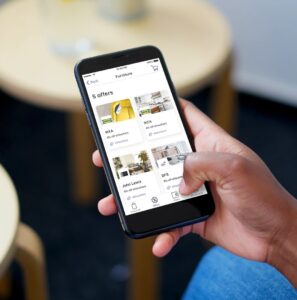
Mobile Experiences
Accelerate innovation and enhance user experience with advanced mobile and app solutions.
Flexible, responsive cross-platform mobile development, for exceptional and intuitive multi-channel experiences
From native and hybrid applications to responsive frameworks and connected cross-channel experiences, our mobile software development services will deliver you high-quality solutions that extend your reach, attract customers, encourage interaction and increase your conversions.

BMJ Best Practice App
Enabling medical professionals to access critical clinical information 40% faster than before through BMJ Best Practice, a cross-platform mobile app that was rebuilt from the ground up by Box UK’s mobile development experts.
Our Services
Creating an effective, high-impact multi-platform experience is about so much more than the technology you use, and Box UK’s experienced software consultants and developers take a holistic approach to deliver a solution tailored to your needs.
User research techniques enable us to build a clear picture of the specific motivations, behaviours, expectations and constraints of your users across different devices – from mobile to desktop, voice interface to out-of-home touchpoints – and understand how users journey across and between different channels to achieve their goals.
Using this information, our analysts and consultants will define a mobile development roadmap that ensures your products and services are available when and where users want them, and supports your wider digital transformation aims. With extensive cross-sector experience they’ll also keep one eye on the future, predicting how emerging technologies and trends may change behaviours and enabling you to respond accordingly.
A User Centred Design (UCD) approach translates your mobile vision into reality, with information architecture and user interface designs delivered as lightweight prototypes for rapid testing and iteration, to validate decisions and ensure a consistent and accessible user experience across devices. Visual design concepts strengthen and enhance this experience, ensuring that users can find what they need quickly and intuitively, regardless of screen size.
Robust coding standards and a proven Quality Assurance process safeguard the quality of all development deliverables, while our expert, technology-agnostic development team will ensure you get a solution that uses the most appropriate tools and languages available to meet your needs:
Responsive Solutions
Manage the proliferation of channels and devices and cater for limitless usage contexts with a responsively-designed site that detects what device is being used and adjusts accordingly. Maintain control of your audience’s experiences with your site no matter how they’re viewing it by tailoring the content, images and functionality for optimal performance and across devices, and future-proof your mobile strategy by designing for the most popular screen sizes to guarantee that primary user needs are met, while still allowing numerous other devices to easily access content.
Native Applications
Take advantage of mobile’s interactive features such as geo-location, touch-screen capability and SMS with progressive native applications. Our development team contains specialists in all major mobile platforms including iOS and Android, with experience creating engaging apps across mobile, tablet and more, while ongoing maintenance and monitoring ensures your apps remain up-to-date and react to the latest advances, with clear reports that filter through data and discover real opportunities for improvement.
Hybrid Cross-Platform Applications
A rapid, cost-effective way of delivering mobile apps, hybrid application development requires the creation of just a single web application that is then automatically wrapped in a native function to enable it to be submitted to multiple platforms (such as those based on iOS and Android operating systems). This approach speeds up time to market, while retaining the necessary flexibility to introduce new mobile-specific features and functionality in line with your wider strategic roadmap.
Cross-platform mobile development technologies
Operating Systems
The platforms that power mobile devices, and support our native/hybrid solutions.
- Windows
- iOS
- Android
Languages
The programming languages we use to build our mobile projects.
- TypeScript
- JavaScript (ES2015)
- HTML
- Sass
Database Technologies
Many mobile software development projects are backed by some form of database system.
- LocalStorage – JSON blob store used for storing arbitrary information in the server
- SQLite – a self-contained, serverless RDBMS often used for testing purposes
- WebSQL – browser copy of SQLite
Frameworks and Libraries
Providing well-tested, reliable code for common functionality.
Frameworks and libraries commonly used on projects are those designed to provide an overall structure to the codebase, often in an Model-View-Controller (MVC) architecture, or to provide an Object-Relational Mapper (ORM).
- React Native – an open-source mobile app framework used to develop applications for Android, iOS, Web and UWP
- Angular – JavaScript framework
- Cordova – mobile hybrid app development platform
- Ionic – mobile hybrid app development platform which is built on top of Cordova and Angular
Cloud Services
Cross-platform mobile app development projects are increasingly hosted in the cloud, or use cloud-based services for their functionality.
- App Center – platform used to build, test and distribute applications
- Bitrise – Continuous Integration and delivery tool, built for mobile app development
- Firebase – mobile platform from Google encompassing a range of tools to quickly develop high-quality mobile apps
Testing and quality
Ensuring code meets our standards of quality.
- ESLint and TSLint – static code analysis tools
- Jasmine – behaviour-driven JavaScript testing library
- Karma – test running environment for JavaScript
- BrowserStack – cloud-based automated testing platform covering more than 2,000 real mobile devices, browsers and operating systems
- Robot Framework – test automation framework for acceptance testing and acceptance test-driven development
- Appium – used together with Robot Framework and BrowserStack CI to provide immediate feedback on compatibility with Android and iOS devices
“Box UK are a pleasure to work with and the team are always enthusiastic about developing new features and improving existing ones. We work in partnership with them to achieve this and they feel like part of our own team rather than an external supplier.”
Jane Clapton, British Medical Journal.
Why Box UK?
With a track record like ours, you can trust in our ability to deliver. Box UK has extensive experience in delivering exceptional mobile development solutions, across a range of industries including finance, healthcare and business services.
Here are just some examples of mobile projects we’ve delivered:
- Helping TBC Bank grow their customer base by 275% in just two years through the delivery of an award-winning multi-channel experience.
- Transforming Investec Asset Management’s digital platform into a responsive service in just 24 weeks from start to finish.
- Opening up a valuable revenue stream for quality-of-life services provider Sodexo through a new hybrid mobile Discounts app, delivered in just eight two-week sprints thanks to a hybrid mobile development approach.
- Enabling medical professionals to access critical clinical information 40% faster than before through BMJ Best Practice, a cross-platform mobile app that was rebuilt from the ground up by Box UK’s mobile development experts.
Talk to one of our digital experts

Pete Withers-Jones
Head of Development
Do you have an idea or a project you need support with?
Pete Withers-Jones leads Box UK’s Development Practice, and has over 20 years of experience in software development, working across various industries and technologies.
Or call us on 020 8098 2093
Frequently Asked Questions
What is the difference between native and cross-platform app development?
Native app development involves programming separate apps for each operating system (e.g. iOS, Android). Cross-platform mobile app development, by contrast, typically involves creating a single web app and automatically wrapping it in a native wrapper that enables it to be submitted to multiple platforms (including iOS and Android) after only needing to develop it once. This approach is also commonly known as ‘hybrid app development’.
What are the advantages of each type of app development?
Native app development delivers the greatest levels of performance and integration with the underlying devices, but also incurs the highest level of costs. If you are only targeting a single platform (e.g. iOS) or are producing a performance/animation intensive app (e.g. a mobile game), then natives is the way to go.
Cross-platform or hybrid app development enables the use of widely available web development skillsets to produce its applications. This allows for very fast development times as the app is only developed once, but deployed to multiple platforms; however, it does have reduced levels of performance on devices.
Another approach to delivering mobile solutions is responsive design, that detects what device is being used and adjusts accordingly. A key benefit of this approach is the flexibility to target a much wider range of devices, however you may miss out on device-specific functionality.
Client Stories
Have a project you’d like to discuss?
Give us a call on 020 8098 2093 or fill in the form and we will get back to you.


